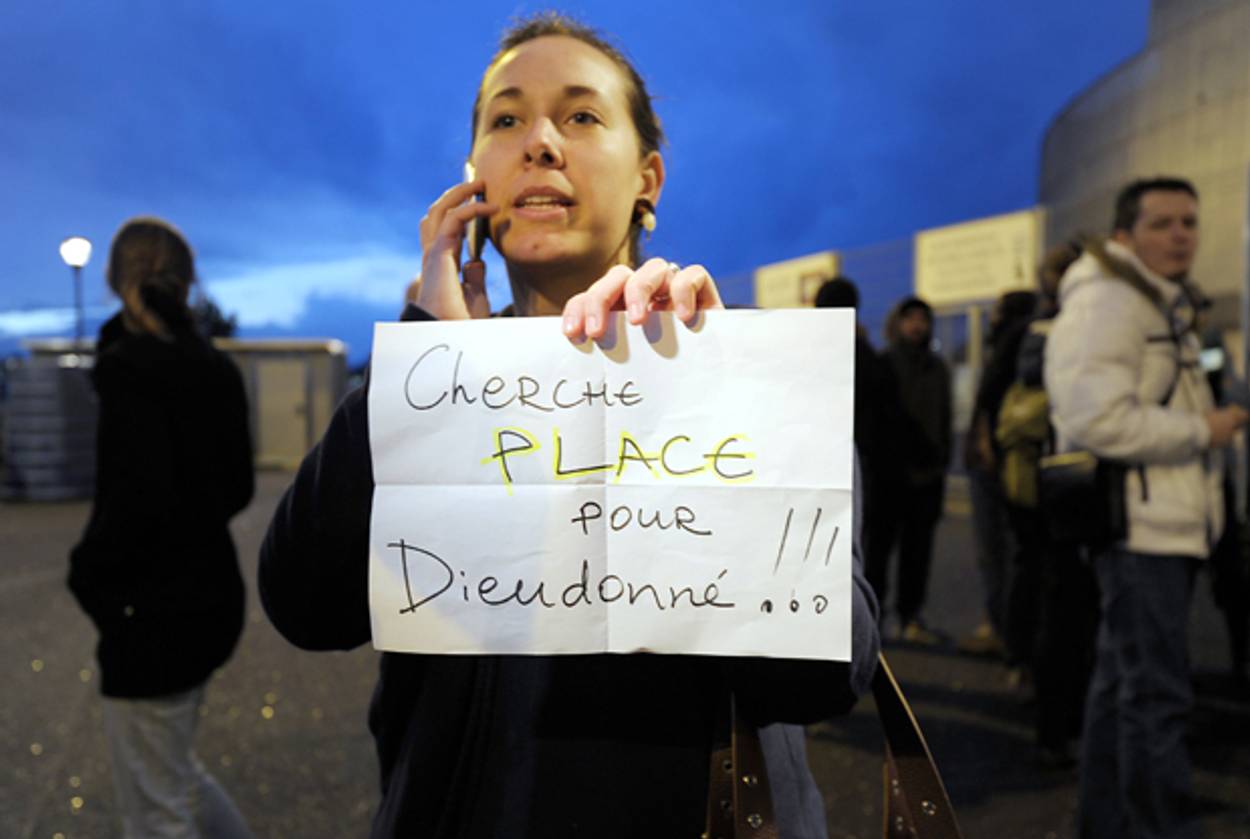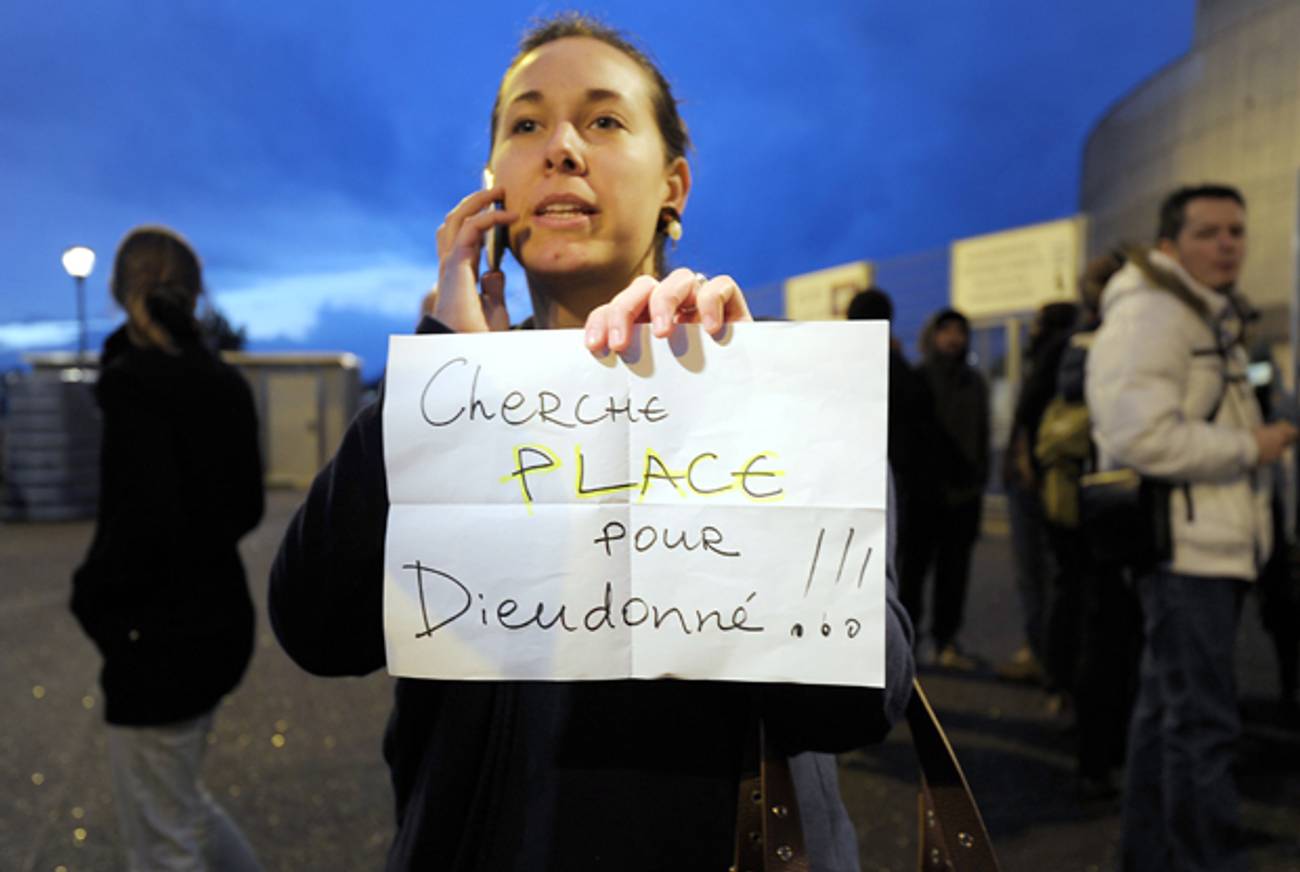Anti-Semitic Comedian Dieudonné in Hot Water With French Authorities
Provocateur’s legal woes coincide with rising anti-Jewish sentiment in Paris




Anti-Semitic rabble rouser extraordinaire Dieudonné M’bala M’bala began the new year with the usual controversy and clamor for negative attention, culminating in his being called in for questioning by the police, suspected of armed assault on bailiffs. The bailiffs were at Dieudonné’s home to collect fines associated with the French-Cameroonian comedian’s multiple convictions for defamation, libel, and incitement to hatred and racial discrimination stemming from his public Holocaust denial and anti-Jewish sentiment. Dieudonné’s exploits might seem like the isolated acts of a provocative performer, were it not for the massive demonstration in Paris yesterday in which anti-government protestors shouted ‘Jews, France is not yours‘ repeatedly in French.
The incident with the bailiffs wasn’t Dieudonné’s first conflict with the authorities in the early days of 2014. Soon after Dieudonné announced the tour for his new show, ‘Le Mur’ (The Wall)—said to be a rumination on the subject of the “memory of the victims of the Shoa”—the ambitious and impatient Minister of Interior, Manuel Valls, swung into action. He sent out a circular memo to the mayors of the towns where Dieudonné was slated to appear, informing them of their right to ban the show on the grounds of defending the public order. (Last September, Valls was himself humiliated as youths he had posed for a photo with had clandestinely flashed the quenelle, the anti-Semitic viral gesture championed by Dieudonné.
Dieudonné’s lawyers contested the ban, and several hours after a court in Nantes ruled in his favor, the Conseil d’Etat, France’s highest court, reversed the decision, banning Dieudonné from performing the show in France. “In the face of the mechanics of hate … we need firmness and determination and great calm,” Valls thundered.
Crowds of angry and disappointed French young men, Dieudonné’s loyalist fanbase, gathered near the theatre in Nantes where the show was supposed to have taken place, protesting the authorities and singing the Marseillaise. Rather uncharacteristically, and perhaps sensing that the French state was on the verge of taking extreme measures against him, Dieudonné capitulated and cancelled the show, announcing instead that he would put on a hastily cobbled-together show composed of African-themed material.
What followed was a fierce national debate over the limits of free speech and the powers of the state to regulate hate speech, with Dieudonné’s face on the front of every major newspaper in France repeatedly during the last three weeks.
Meanwhile, Dieudonné had over the years amassed eight convictions for the uniquely French crimes of defamation, libel, and incitement to hatred and racial discrimination, since Holocaust denial is illegal in France. All those unpaid convictions added up to nearly one hundred thousand euro, a fact that did not go unnoticed by les Huissiers de Justice, the collection arm of the Justice Ministry, who this week dispatched two bailiffs to Dieudonné’s home in Saint-Lubin-de-la-Haye to initiate collection procedures.
What is certain is that Dieudonné’s partner and his security staff became engaged in a verbal altercation with the bailiffs, demanding that they leave. The bailiffs claim that after being told to leave, they were fired on with what was either a rubber projectile or a flash gun. Dieudonné’s lawyers allege that the bailiffs arrived after business hours and trespassed on his personal property when they attempted to hop over a fence.
Dieudonné was called into a police station the following day, where he gave a deposition and was reportedly kept for several hours as a person of interest in the attempted assault charges. After a warrant was issued, his home was searched and a “projectile device” was discovered. The bailiffs remain uncertain about who opened fire on them.
Dieudonné has since begun a video crowd-sourcing campaign to help pay the conviction fees, though soliciting money to pay for one’s convictions is expressly forbidden under French law. France’s fraud squad, known as the BRDP, has opened a preliminary investigation into this as well as allegations that he transferred all proceeds from his shows to his partner to avoid them being seized to pay for the fees for his convictions.
Previous: ‘Jew, France is Not Yours’ Chant Anti-Government Demonstrators in Paris
French Court Convicts L’Antisémite Director
Related: L’Antisémite, Banned at Cannes
Vladislav Davidzon is Tablet’s European culture correspondent and a Ukrainian-American writer, translator, and critic. He is the Chief Editor of The Odessa Review and a Non-Resident Fellow at the Atlantic Council. He was born in Tashkent, Uzbekistan, and lives in Paris.